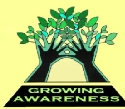

How to love, nurture and protect your inner child.


Website design and content copyright © John Bligh Nutting and Growing Awareness Pty Ltd - 2001 -2016 All rights reserved World wide
DISCLAIMER: Growing Awareness Pty Ltd as publishers of this web-site and John Bligh Nutting as author do not dispense or recommend medical or psychiatric advice, nor prescribe the use of any technique as a form of treatment for any diagnosable medical or psychiatric condition. Any such action should only be taken by you as your personal choice and either directly or indirectly on the advice of a physician or a qualified therapist.
 Love Your Inner Child/index
Love Your Inner Child/index
Open communication is a personal power skill
Raise the unspoken or non-verbal up to the discussable or verbal level
or “Naming the Elephant in the room”
BUT
Bringing emotional elephants out into the open, by talking or writing about them, is a powerful personal skill with ordinary people. It can cause a major reaction with NBP players
In ordinary situations, open communication creates personal power and leads to considerably more success than ‘closed’ communication. When you communicate using your personal channels that’s obviously more open. Open communication is basically honest and the meanings exchanged are real. Closed communication is of course impersonal and less likely to be reliable.
But there are other advantages. When you communicate openly the meanings you exchange are clearer, so you have fewer misunderstandings This means you can exert a more balanced level of influence or control in difficult situations. You are better able to resist others who attempt to manipulate you. You’ll enjoy a happier more relaxed lifestyle.
There’s power in “Naming” the Elephant
Think of the benefits of identifying any issue openly, naming it out loud compared with the powerlessness of keeping it unspoken and undiscussable.
Sometimes there is a critical issue that everyone in the group is concerned about but by some unspoken agreement nobody mentions it. Not only is it not discussed but even the nature of its being that way cannot be discussed. This situation is commonly referred to as having an ‘elephant in the room’. It’s big, it’s powerful, if it gets loose it could wreck the place and it probably smells a bit too.
But no one is even mentioning it.
Raise the unspoken or non-verbal up to the discussable or verbal level
Once the hidden issue (the elephant) is out in the open everyone can talk about it and that opens the way for positive change.
Converting the undiscussable or unspoken into ordinary verbal messages is positive. If it’s a power and control issue it is no longer ‘background’, now it’s right out in the open. In this way everyone can start to deal with a problem before it causes more trouble, which is bound to happen with any big smelly elephant size problem as long as it remains ‘undiscussable’.
When you convert those unspoken issues into words you are helping everyone but you are also sending another powerful personal signal about you as an open communicator.
If you were the person who raised the matter up to the verbal level using open communication that adds to your personal power. You are identifying yourself as an open communicator and to some extent a leader.
Naming your own personal “elephants”
We all have issues inside that trouble us, cause us to feel a bit too vulnerable. While they too remain unnamed they are far more difficult to deal with.
As a psychotherapist I continue to be amazed at the difference in a person’s sense of power once they put any deep or painful issue into words. It’s one of the reasons counselling works. People sit quietly in a safe environment with a caring professional listener and with a little encouragement “name” the deeper issue that is troubling them, out loud, not just the signs or symptoms but the real underlying issue. They have raised their personal elephant from the unspoken up to the discussable. At that moment their power to change goes up too.
It’s the same in any self awareness or therapy group. People start talking about their deeper issues, bringing them out into the open but in a safe environment where others in the group give support often adding “Yes, that’s what I feel too.” Everyone gets to raise their elephants up to the named level, openly.
In Twelve Step groups like Alcoholics Anonymous AA, one of the traditions is the naming of the issue. Every meeting begins with each member introducing them self:
“My name is _ _ _ _ _ _ and I am an alcoholic.”
They have a saying in AA that when you name the issue you are putting it out in front of you where you and everyone else can keep an eye on it. Unnamed it remains behind your back, you can’t see it and that’s when, as they say in AA:
.... “ it can bite you on the backside!”
Bringing emotional elephants out into the open, by talking or writing about them, is a powerful personal skill with ordinary people. It can cause a major reaction with NBP players
| Stories and fables for Inner Children |
| Free Books |
| Starting Point |
| spare |
| AdverseChildhoodExperiences ACE survey |
| Orchestral Fable |
| Your Inner Village and its Characters |
| Little Alan's Christmas |
| Muddled Magic and the Little Trauma Witch |
| Why tell stories rather than talk psychology? |
| Little Gloria |
| Bibliography |
| Self Defeating RSDP |
| DTD Developmental Trauma Disorder |
| Is it Safe for me to Change |
| Reviews |
| Personal or Impersonal |
| Addictions |
| Open Communication |
| School of Life |
| Which Comes first |
| The Path and the Holes |
| More About John Nutting |